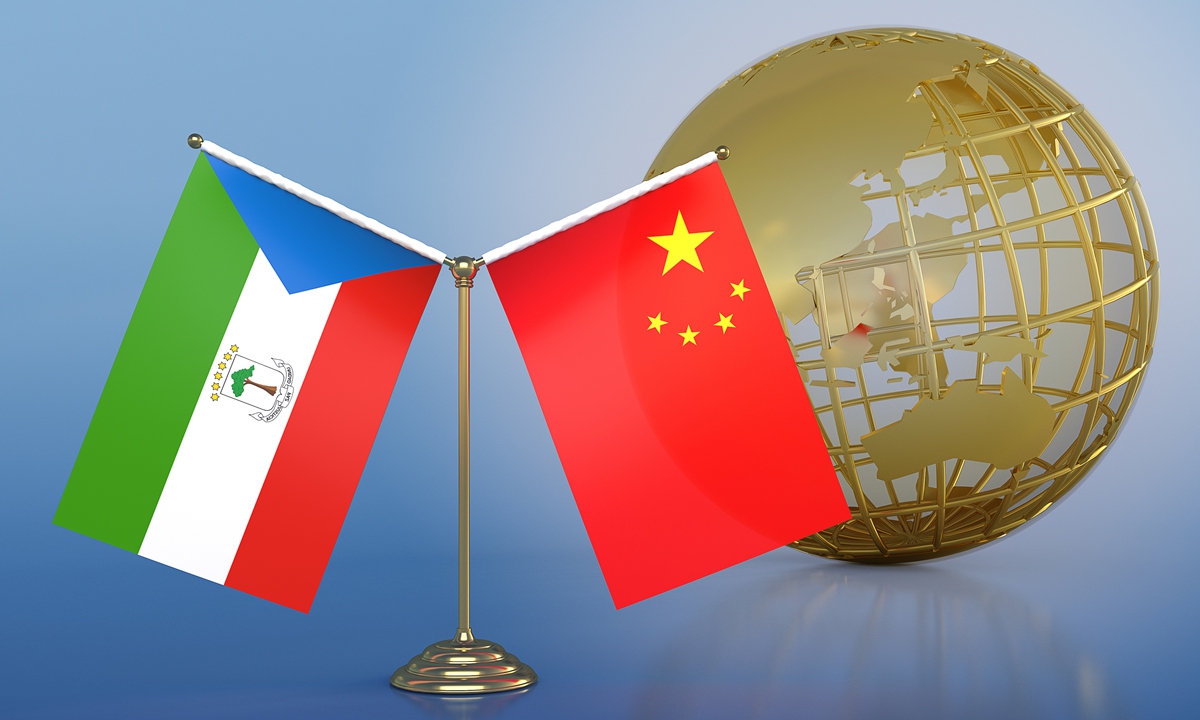
China & Equatorial Guinea. Photo:VCG
Chinese President Xi Jinping held talks with Teodoro Obiang Nguema Mbasogo, president of the Republic of Equatorial Guinea, in Beijing on Tuesday, and the two heads of state announced the elevation of bilateral relations to a comprehensive strategic partnership of coordination.
This opens a new chapter for the two countries to bridge development plans, deepen cooperation and pursue common growth, setting a model for more cooperation between China and other West African states, analysts said.
During the meeting, Xi said China and Equatorial Guinea are good friends and partners, and their relations feature a high level of political mutual trust, Xinhua News Agency reported.
China firmly supports Equatorial Guinea in safeguarding national sovereignty and independence, opposing foreign interference, and independently exploring its own development path, he said.
China is ready to take the opportunity of elevating bilateral ties to further deepen friendly exchanges with Equatorial Guinea, and exchange experience in reform, development and poverty alleviation to inject lasting impetus into the two countries' traditional friendship, Xi said.
After their meeting, Xi and Obiang witnessed the signing of cooperation documents including on investment, economic growth, digital economy, green development and implementation of the Global Development Initiative.
Song Wei, a professor with the School of International Relations at Beijing Foreign Studies University, told the Global Times on Tuesday that the elevation of ties to a comprehensive strategic partnership of cooperation marks a new page in bilateral relations.
By defining the relationship as comprehensive and strategic, the two countries can bridge their development strategies, such as the China-proposed Belt and Road Initiative (BRI) with Equatorial Guinea's programs, and better respond to the development needs of both countries, Song said.
The two countries will also enhance coordination on each other's core interests, issues of common concerns and key international affairs, the expert said.
Obiang said in an interview with the Xinhua News Agency published on Friday that "Over the past 54 years since the establishment of diplomatic relations, China and Equatorial Guinea have steadily advanced major cooperation projects in infrastructure construction, technical assistance and other areas. Projects, such as the port of Bata on the Gulf of Guinea and the Djibloho Hydropower Plant, built or aided by Chinese enterprises, have brought tangible improvements to the life of local people."
Speaking of the outcomes achieved under the framework of the Forum on China-Africa Cooperation and the BRI, Obiang said cooperation in fields such as health, agriculture, commerce and technology has greatly boosted Equatorial Guinea's economic and social development.
Song noted China's role in improving Equatorial Guinea's infrastructure and intra-connectivity, as well as its industrialization, as the country has rich natural resources.
"Bilateral cooperation will not only bring about immediate benefits to the African country, but also boost the country's development capability, diversifying its economic structure and strengthening its economic security," Song said.
Equatorial Guinea relies heavily on resources exports, such as oil and gas, an industry operated mainly by Western companies. Timber ranks second among its economic pillars while the traditional agriculture and fisheries sectors have shrunk in its economic structure amid the expansion of oil exploration and export. The government is seeking to revitalize them while also pushing forward industrialization, per an investment guidebook co-released by Chinese Academy of International Trade and Economic Cooperation.
Equatorial Guinea is situated in the Gulf of Guinea, a pivotal area in West Africa. Against the backdrop of some unrest in the region, as well as escalating international power struggles, Song believes "the partnership between China and Equatorial Guinea will serve as an inspiration for fostering relations between China and other countries in the Gulf of Guinea and West Africa."
The US has withdrawn troops from West Africa's Chad and Niger, according to media reports. The Associated Press claimed that "The reversals have prompted concern that US influence in Africa is losing ground to overtures from Russia and China."
China's ever-growing cooperation with African countries and other Global South nations is based on a shared aspiration for development and prosperity, and the US should understand and acknowledge that most countries in the world are not interested in taking sides or forming confrontational camps, analysts said.
Demonizing China's cooperation with others or hyping "China threat" will not help the US win partners, they said.




